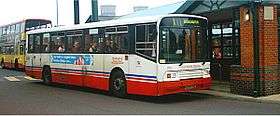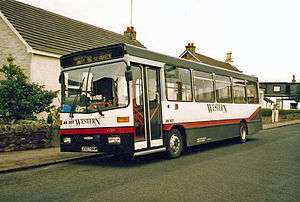Mexborough and Swinton Traction Company
The Mexborough and Swinton Traction Company was the name adopted by the Mexborough & Swinton Tramways Company in 1929 following the introduction of trolleybuses on all its routes. It operated in the West Riding of Yorkshire, England, over routes serving Manvers Main Colliery, Wath upon Dearne and the towns of Rotherham, Rawmarsh, Swinton, Mexborough, Conisbrough and the estate at Conanby.
The first opening took place in 1907 and was owned by the National Electric Construction Co., becoming part of the British Electric Traction Group in 1931.
Early bus conversion
The company's first attempt at rail-less operation was in 1910 when a Thornycroft charabanc, hired from the Musselburgh Tramways Company, was tried for a short period, operating between the Old Toll Bar (Mexborough) and Denaby Main Colliery Village, and also from Mexborough to Wath via Manvers Main Colliery. Objections from Mexborough Council caused the withdrawal of the service and, because of this, the company turned its attention to "rail-less traction" and a new Act of Parliament, the Mexborough & Swinton Tramways Rail-less Electric Traction Act, 1913 gave authority for the "Trackless", as it was known to the locals.
In 1915 the company opened two trolleybus routes: the first ran from Mexborough town centre to Manvers although failing to reach the main gates of the colliery due to a low bridge below the Midland Railway line; the second ran from the Old Toll Bar to Conisbrough. Manvers is the only locality in England to have had a trolleybus before a tramway.
After the war
Following the end of World War II a new livery was introduced, starting with the company's six austerity Sunbeam trolleybuses. The red/brown livery which had been carried since the early days was replaced by a brighter green and cream livery. It was well received and the rest of the fleet followed. The first new vehicles to carry the livery were delivered in 1947.
Route changes were proposed and first was an application to extend from the Adwick Road terminus in Mexborough to the newly built Windhill estate. It never happened and Windhill was not directly served until the coming of the motor bus route, itself short-lived (December 1948 to June 1953) as the route was unprofitable. The second application was to ease the traffic problems in the narrow streets of Conisbrough and in this respect a new link along Station Road to allow one-way working was proposed. This was opened by March 1948.
The beginning of the end of the trolleybus system started in 1953 when an order was placed for ten Leyland Tiger Cubs with Weymann B44F bodywork (Nos. 40-49 / MWU140-MWU149), which arrived the following year. Another three changes took place at the same time. To house miners who were moving into the area, particularly from Scotland, the National Coal Board built a new estate, known as "The Concrete Canyon" at Sandhill, Rawmarsh, and, to serve this, a new route between Parkgate and Kilnhurst was developed. This was then extended to the Woodman Inn, Swinton (later Cresswell Arms, Swinton). Secondly, a new route from Rotherham to the newly built Monkwood estate in Rawmarsh (Route 'M'. later '6') which joined the main road at the top of Blythe Avenue. The third change, which took place on 27 September 1954, was the conversion of the Rawmarsh (Green Lane, route 'S', later '7')) to Rotherham trolleybus service to motor bus operation. At the beginning of 1961 the Manvers Main to Conanby route, mostly paralleled by new motor bus routes, was itself converted and the last trolleybuses ran on 26 March 1961. The Leyland Atlantean buses ordered as replacements were the first double-deckers in the fleet.
Finale
Mexborough & Swinton Traction Company Limited was absorbed into the Yorkshire Traction Company on 1 October 1969, after more than sixty years of service to the Don Valley communities.
References
- Official company 60th anniversary handbook, (1962).
- The Mexborough & Swinton Traction Co., by Chas C. Hall, "Buses Illustrated", (Nov.61-Jan.62).
- PSV Circle Fleet History (1984).

